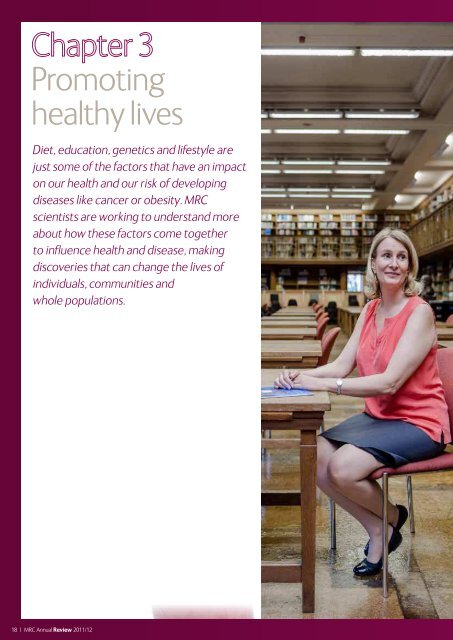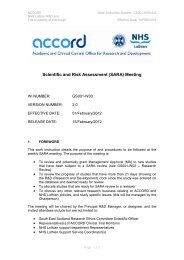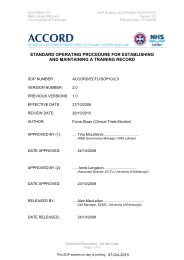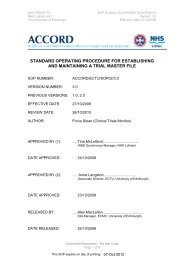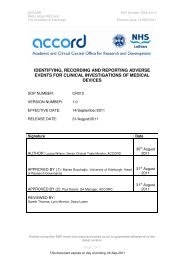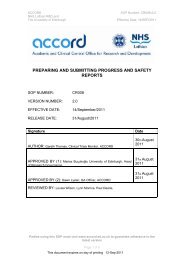Advancing medicine, changing lives - Medical Research Council
Advancing medicine, changing lives - Medical Research Council
Advancing medicine, changing lives - Medical Research Council
Create successful ePaper yourself
Turn your PDF publications into a flip-book with our unique Google optimized e-Paper software.
PROFILE: Dr Cari Free, London School of Hygiene and Tropical Medicine<br />
Promoting<br />
healthy <strong>lives</strong><br />
Diet, education, genetics and lifestyle are<br />
just some of the factors that have an impact<br />
on our health and our risk of developing<br />
diseases like cancer or obesity. MRC<br />
scientists are working to understand more<br />
about how these factors come together<br />
to influence health and disease, making<br />
discoveries that can change the <strong>lives</strong> of<br />
individuals, communities and<br />
whole populations.<br />
In January 2012 the Department of Health launched<br />
an affordable mobile phone support programme for<br />
smokers, which has been proven to double quit rates. This<br />
programme was developed for UK patients by Dr Cari Free<br />
at the London School of Hygiene and Tropical Medicine<br />
(LSHTM) with MRC funding. Around 1,000 smokers are now<br />
signing up each month.<br />
Cari’s office at the LSHTM is high-ceilinged and airy. The<br />
walls are lined with medical textbooks on everything from<br />
cancer to condoms. It’s here that she works four days a<br />
week as a senior lecturer, leading research studies in public<br />
health. On the fifth day of the week she’s a GP in South<br />
London which keeps her in touch with some of the patients<br />
her research will benefit.<br />
Smoking is a notorious public health problem, causing heart<br />
attacks, stroke and lung cancer and it’s fast becoming an<br />
epidemic in developing countries like India and China. So<br />
affordable and effective ways to help people quit are in<br />
higher demand than ever.<br />
A few years ago, Cari heard about a study in New Zealand<br />
called Stomp, which used motivational mobile phone text<br />
messages to encourage smokers to give up. Results were<br />
promising, but it was unclear whether the text messages<br />
helped people to stop long term. So the LSHTM researchers<br />
decided to do a modified version of the study in the UK to<br />
pin down whether text message support really does help<br />
people to stay off cigarettes. After a successful pilot study,<br />
the MRC agreed to fund a large-scale trial involving 5,800<br />
people, known as Txt2stop.<br />
Five text messages were sent each day to participants for<br />
the first six weeks of the study, preparing them to quit<br />
by asking them to think about why they wanted to stop<br />
smoking. After the quit date they were sent supportive<br />
messages, including reassurances about when the cravings<br />
would subside.<br />
of people who said they’d quit had either relapsed by the<br />
time they saw us or just cut down rather than quit.”<br />
So what is Txt2stop’s secret to success? Was there a<br />
winning formula for the text messages that really cut to the<br />
core of people’s nicotine addiction?<br />
“People said that it was like having somebody at your side<br />
reminding you that you were going to quit and why you<br />
were doing it – and the tone of the messages was definitely<br />
set up to be supportive in that way,” says Cari.<br />
“People particularly liked the messages where they got<br />
feedback about what they’d gained and how well they’d<br />
done. For example we sent messages saying ‘shortly after<br />
you start quitting your carbon monoxide level goes back<br />
to normal’ and then they’d receive a message at the point<br />
when their levels had returned to normal saying ‘well done’.<br />
One person said she was on the way to the shops to buy<br />
cigarettes when she got that message and then turned<br />
around and went home again.”<br />
The research team thinks the text message support works<br />
by helping to sustain people’s motivation at times when<br />
their resolve is weaker, and through providing contact and<br />
support over a 24-hour period. For example, trial members<br />
could text the word CRAVE to receive a supportive message<br />
when they were struggling with craving.<br />
“The peak of a cigarette craving only lasts for a minute,<br />
so part of the idea behind that message was whilst you’re<br />
texting, waiting for the message to arrive and then reading<br />
it, you’re not smoking – and by that point, the craving has<br />
usually subsided,” explains Cari.<br />
Txt2stop was equally effective for all age groups and across<br />
all levels of addiction and its benefits were so immediately<br />
clear that the Department of Health launched the<br />
programme on the NHS smoking website earlier this year.<br />
The results were very exciting, says Cari: “The trial very<br />
clearly demonstrated that text message support doubles<br />
the number of people who quit smoking after six months<br />
compared with those who didn’t receive the texts.”<br />
An important part of the study’s design was independently<br />
measuring whether people really had quit. So study<br />
members also had to post in samples of their saliva six<br />
months after taking part in the trial. These were tested for<br />
cotinine, a by-product of nicotine, which is a stable and<br />
reliable test of whether someone is smoking or has smoked<br />
over the previous few days.<br />
“That was really just to check they were telling the truth,”<br />
explains Cari. “That’s important, because about 30 per cent<br />
“Smoking cessation is one of the most cost-effective<br />
interventions you can make from a public health<br />
perspective because about half of people who smoke<br />
beyond the age of 40 will shorten their life as a result. The<br />
intervention represents a major cost saving to the NHS,”<br />
says Cari.<br />
Txt2stop could have an even bigger impact beyond our<br />
shores. The World Health Organization predicts that by<br />
2030 the annual worldwide smoking death toll will have<br />
risen from six million to eight million, with the biggest<br />
rise occurring in poorer countries. With mobile phone<br />
usage widespread across the world, Txt2stop could offer<br />
a low-cost and effective means of helping people in these<br />
countries to give up.<br />
18 | MRC Annual Review 2011/12 MRC Annual Review 2011/12 | 19


